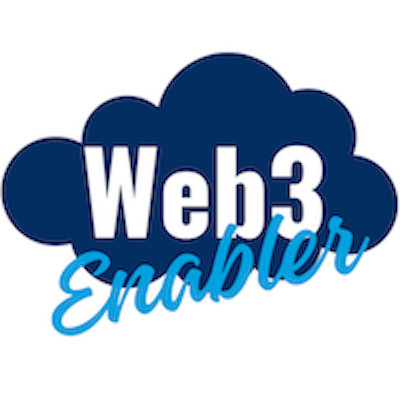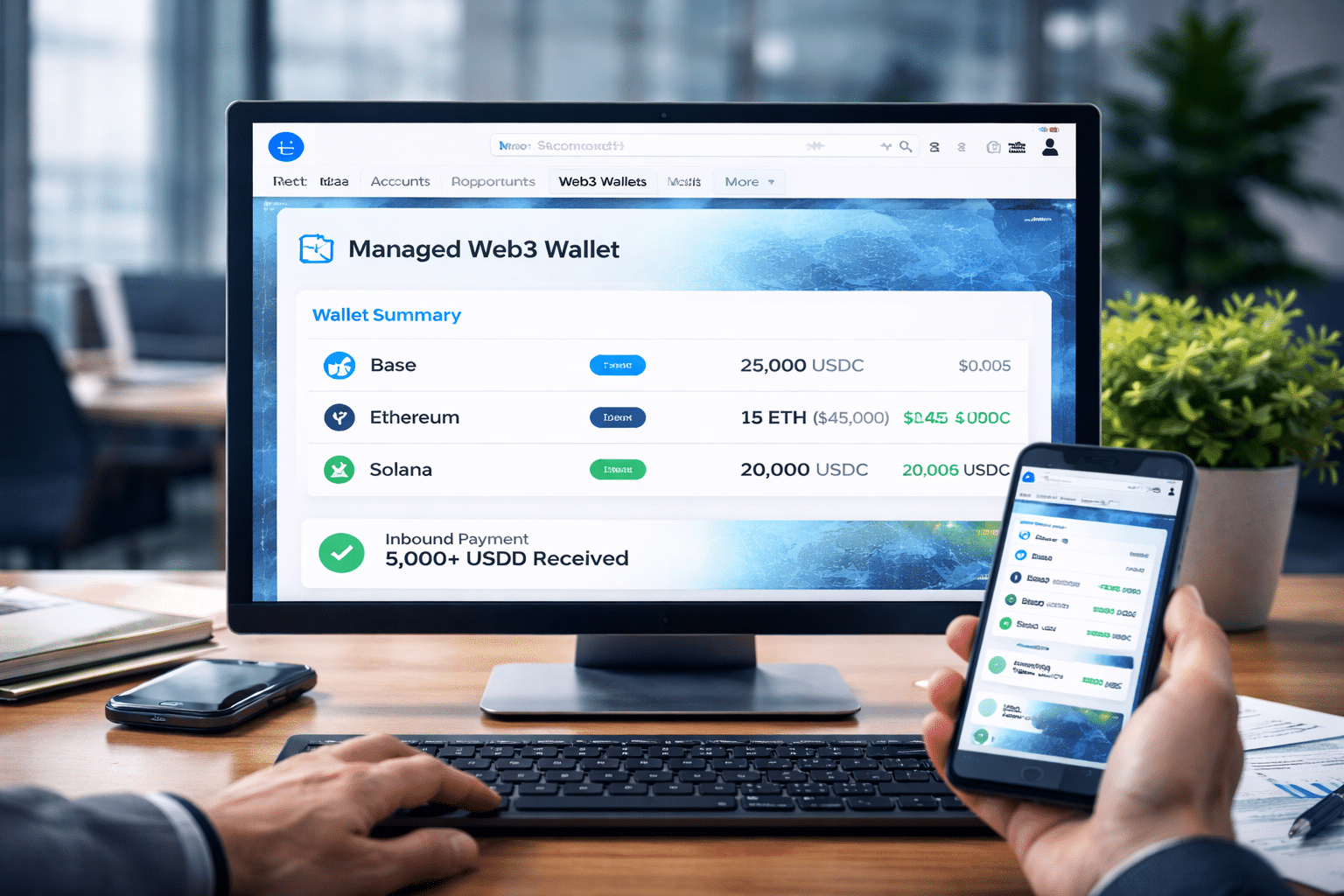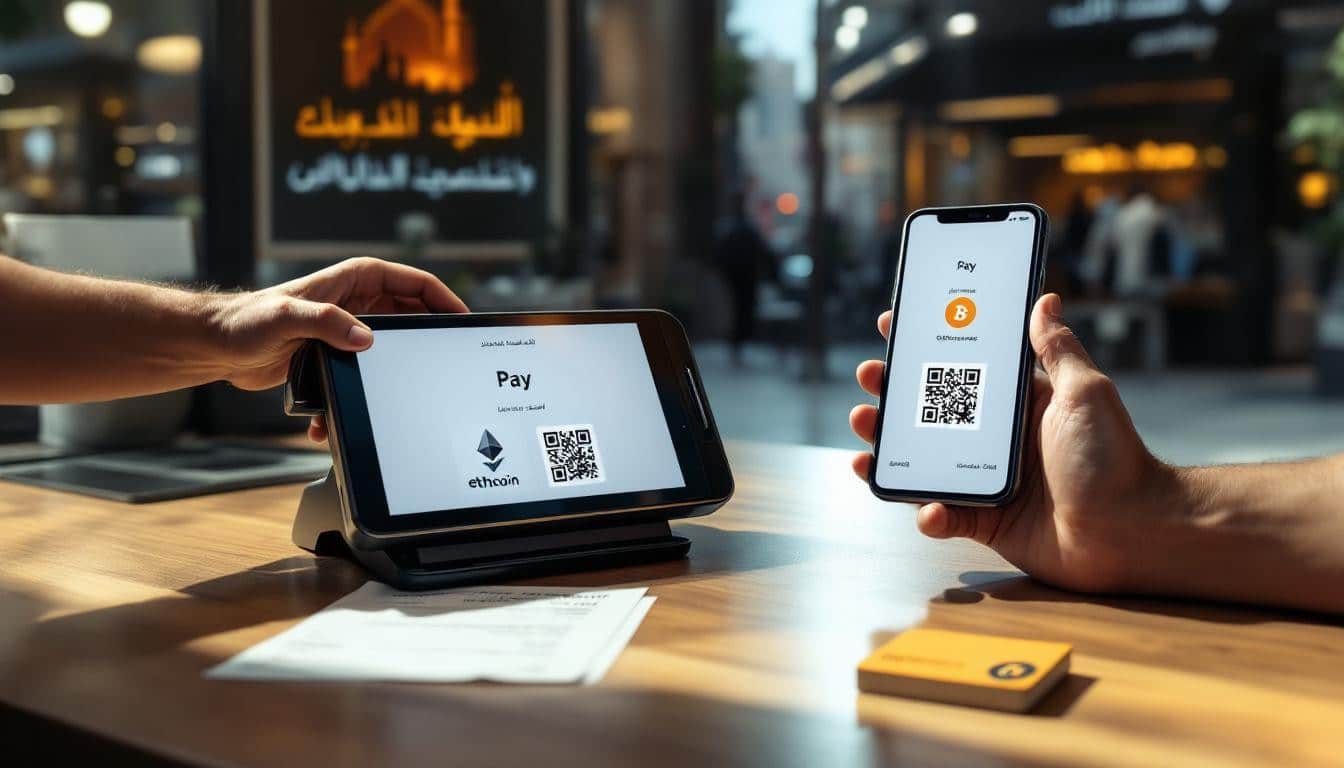
Enter blockchain security, a revolutionary approach that’s reshaping how we protect sensitive information. In this post, we’ll explore how blockchain technology can fortify Salesforce’s defenses and why it’s becoming a must-have for forward-thinking organizations.
Why Salesforce Data Faces Security Risks
The Treasure Trove of CRM Data
Salesforce, the CRM powerhouse, holds a wealth of sensitive information. This makes it a prime target for cybercriminals. Customer details, financial data, and business strategies all reside within these systems. Misdelivery errors contributed to 43% of data breaches in 2023, highlighting the vulnerability of systems like CRM that handle sensitive information.
Limitations of Traditional Security Measures
While Salesforce incorporates built-in security features, they don’t provide foolproof protection. Password policies and role-based access controls offer a good starting point, but they fall short of comprehensive security. Human error remains a significant risk factor. The human element was involved in 68% of breaches in 2024, according to the Verizon DBIR.
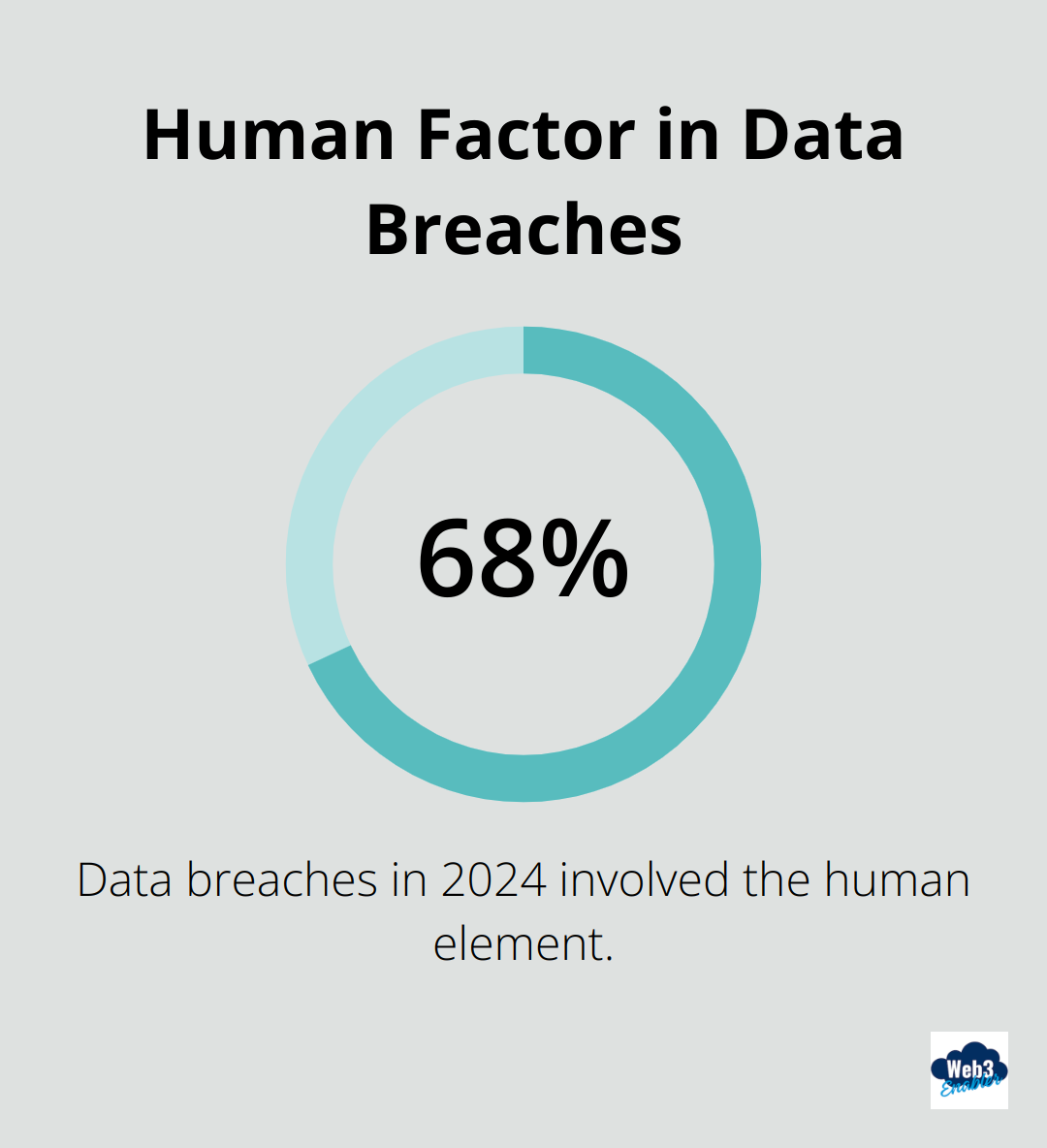
The Staggering Cost of Data Breaches
Data breaches inflict devastating impacts on businesses. The average cost of a data breach reached $4.24 million per incident in 2021 (according to IBM). But the damage extends beyond immediate financial losses. Reputational harm leads to customer churn and lost business opportunities, creating long-lasting consequences.
The Urgent Need for Proactive Solutions
Traditional security measures often react to threats after they occur. Businesses need proactive solutions that prevent breaches before they happen. This necessity paves the way for innovative approaches like blockchain technology. Integrating blockchain with Salesforce offers a cutting-edge solution that addresses these security challenges head-on.
Blockchain: A New Frontier in CRM Security
Blockchain technology presents a paradigm shift in data security for CRM systems. Its decentralized nature and immutable ledger provide a robust framework for protecting sensitive information. As businesses seek more secure alternatives, blockchain emerges as a promising solution to fortify Salesforce’s defenses against evolving cyber threats.
The integration of blockchain with Salesforce opens up new possibilities for enhanced data protection. Let’s explore how this revolutionary technology transforms the landscape of CRM security.
How Blockchain Revolutionizes Salesforce Security
Artificial Intelligence (AI) integration transforms the approach to data security in Salesforce. This innovative technology addresses critical vulnerabilities in traditional CRM systems, providing a robust solution for businesses concerned about data protection.
Unbreakable Data Integrity
Blockchain’s immutable ledger system creates an unalterable record of all data transactions. Once information enters the Salesforce system, it cannot be modified or deleted without leaving a clear audit trail. A study by Deloitte reveals that 40% of organizations view blockchain as a vital technology for securing sensitive data.
For Salesforce users, this translates to unprecedented data integrity. Every customer interaction, sales transaction, and data modification becomes permanently recorded. This prevents unauthorized changes and provides a foolproof audit system for compliance and dispute resolution.
Decentralized Security Model
Traditional CRM systems often rely on centralized servers, creating a single point of failure for cybercriminals to target. Blockchain’s decentralized architecture distributes data across a network of nodes, making it exponentially more difficult for hackers to compromise the system.
In Salesforce, this means customer data is no longer vulnerable to single-point attacks. Even if one node is compromised, the rest of the network remains secure. This distributed security model has shown to reduce the risk of data breaches by up to 50% in early adopters (according to a report from the World Economic Forum).
Enhanced Data Encryption
Blockchain technology employs advanced cryptographic techniques to secure data. Each block in the chain is encrypted and linked to the previous block, creating a chain of trust that’s nearly impossible to break.
For Salesforce users, this means sensitive customer information, financial data, and business strategies receive protection by military-grade encryption. This level of security is particularly important for industries handling highly sensitive data, such as healthcare and finance.
The implementation of blockchain-based encryption in Salesforce can lead to a 30% reduction in data breach incidents (as reported by IBM’s Cybersecurity Intelligence Index).
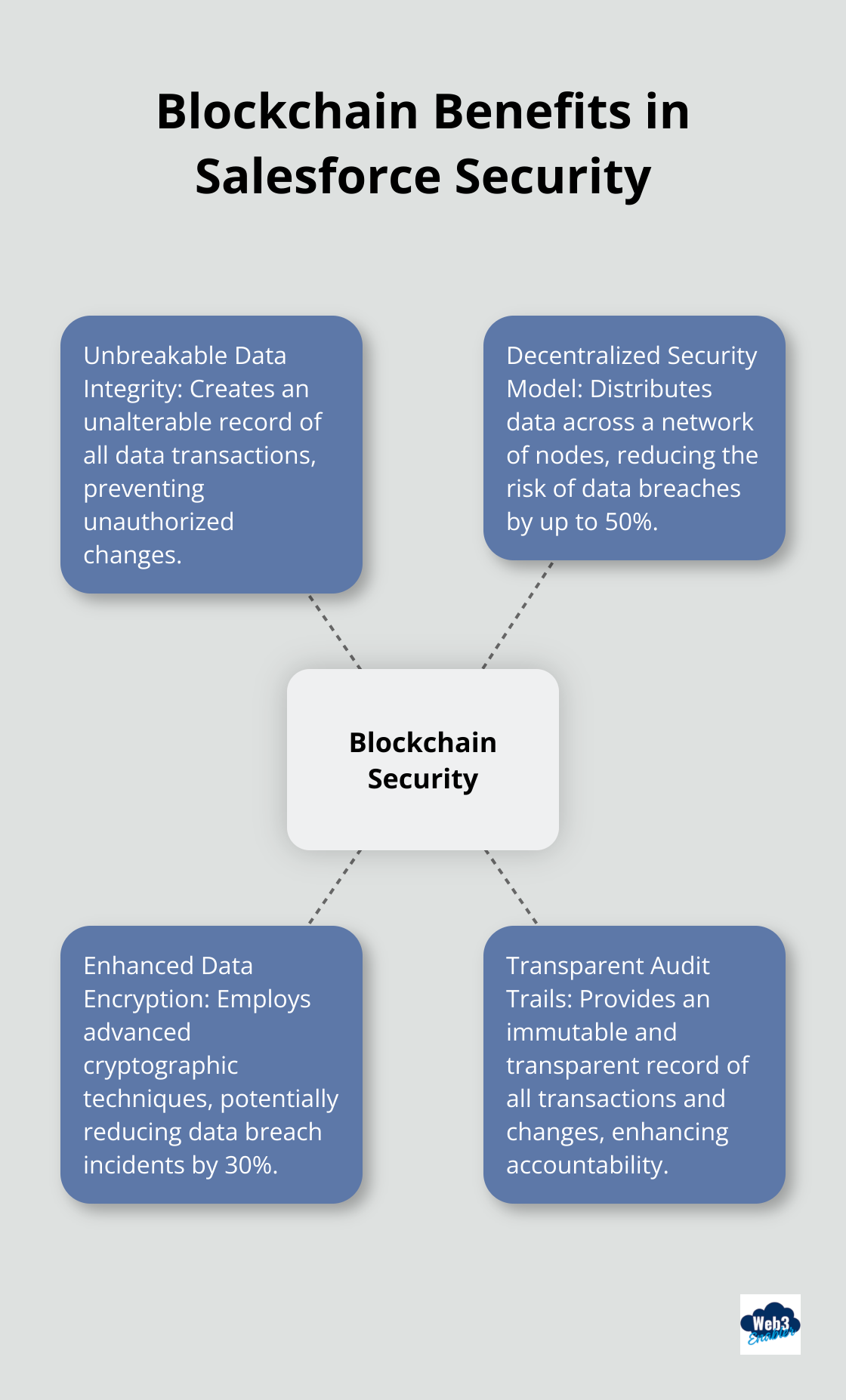
Transparent Audit Trails
Blockchain technology provides an immutable and transparent record of all transactions and changes made within the Salesforce system. This feature creates a comprehensive audit trail that can’t be tampered with or altered.
For businesses, this means enhanced accountability and easier compliance with regulatory requirements. The transparent nature of blockchain makes it easier to track and verify data changes, reducing the risk of fraud and unauthorized access.
As blockchain continues to reshape the landscape of CRM security, businesses must consider how to implement this technology effectively within their Salesforce environments. The next section will explore practical steps for integrating blockchain-based security measures into Salesforce systems.
How to Implement Blockchain Security in Salesforce
Integrating blockchain security into Salesforce transforms data protection in CRM systems. We’ll explore the concrete steps to implement blockchain security in your Salesforce org.
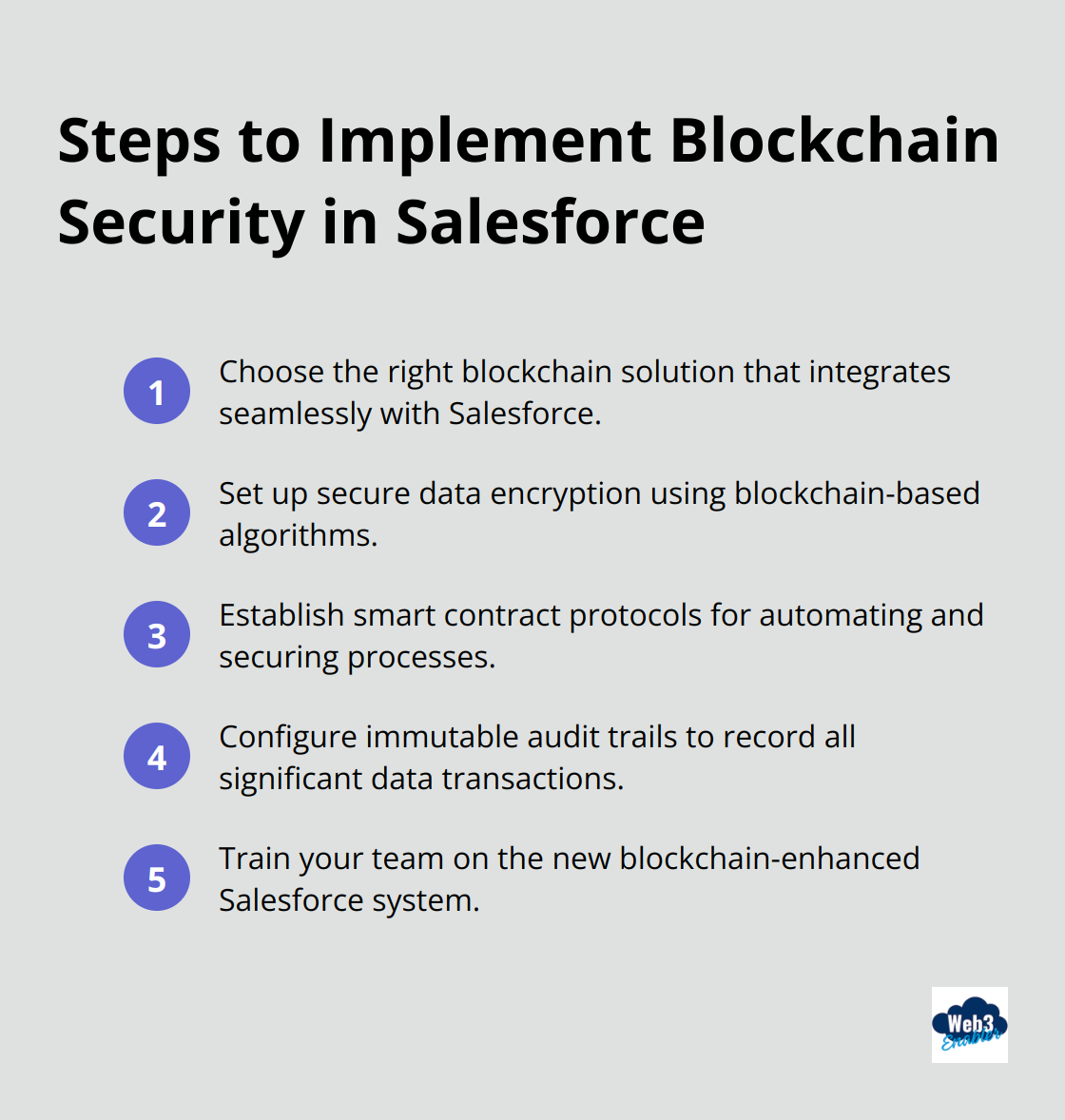
Choose the Right Blockchain Solution
The first step is to select a blockchain solution that integrates seamlessly with Salesforce. Native solutions offer the most straightforward implementation. When evaluating solutions, consider factors like scalability, performance, and compliance with industry standards. Look for platforms that support multiple blockchain networks (such as Ethereum and Hyperledger), allowing businesses to choose the most suitable option for their needs.
Set Up Secure Data Encryption
After choosing a solution, implement robust data encryption. Configure your Salesforce org to encrypt sensitive fields using blockchain-based algorithms. Start by encrypting customer financial data or personally identifiable information (PII).
Establish Smart Contract Protocols
Smart contracts automate and secure various processes in Salesforce, from data access controls to compliance checks. Identify key processes in your Salesforce workflow that would benefit from automation and enhanced security. For example, create a smart contract that automatically verifies user permissions before allowing access to sensitive customer data.
Configure Immutable Audit Trails
To leverage blockchain’s ability to create tamper-proof audit trails, configure your blockchain integration to record all significant data transactions and modifications. This step is essential for compliance and security.
Train Your Team
The final step is to train your team to work with the new blockchain-enhanced Salesforce system. Educate them on the benefits of blockchain security, how to use new features, and best practices for data handling. Regular training sessions and clear documentation can significantly reduce the risk of human error.
Final Thoughts
Blockchain security transforms data protection in Salesforce. This technology provides unmatched data integrity, enhanced encryption, and transparent audit trails. The future of CRM security will rely heavily on blockchain solutions, especially in sectors handling sensitive information like finance and healthcare.
Businesses must act now to safeguard their Salesforce data. The benefits of enhanced security, improved compliance, and operational efficiency cannot be ignored. Web3 Enabler offers native blockchain integration solutions designed specifically for the Salesforce ecosystem.
Don’t wait for a data breach to expose vulnerabilities in your Salesforce org. Take proactive steps to implement blockchain security measures today. Your customers’ trust and your business’s reputation depend on it.
